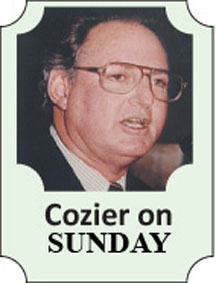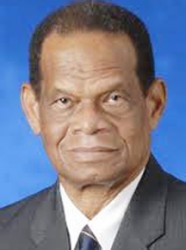AS new president of the West Indies Cricket Board (WICB), Dave Cameron, takes his place at the head of the table he finds a plate before him spilling over with urgent matters to attend to.
Since it took a rogue vote from one of the delegates of the regional boards to prevent what would have been a 6-6 deadlock in his challenge to long-serving president, Julian Hunte, at the annual general meeting last Wednesday, he would appreciate that securing unity among the board of directors is a priority.
Improving relations with the West Indies Players Association (WIPA), so consistently confrontational, turning around the grim financial situation and, as crucial as anything else, checking and upgrading the diabolical standard of the regional game are unquestionably others.
Although he has been on the WICB for over a decade now, little was known of Cameron outside of Jamaica until he mounted his drive for the top post. He managed to convince three of the shareholder boards; he takes over fully aware that knowing that the other three boards favoured a fourth term for Hunte, even if one of their delegates went against the mandate and took what he personally considered the best option.
 Given the irrationality of human nature along with the intensity of the election campaign, with its media interviews, Cameron’s trans-Caribbean lobbying and his criticism of how his case was handled by the Barbados Cricket Association (BCA), it is a delicate balance that needs diplomatic handling.
Given the irrationality of human nature along with the intensity of the election campaign, with its media interviews, Cameron’s trans-Caribbean lobbying and his criticism of how his case was handled by the Barbados Cricket Association (BCA), it is a delicate balance that needs diplomatic handling.
Dealings with the WIPA is another area to test the new president. Those who see it as an advantage that he and his CEO, Michael Muirhead, and their WIPA counterparts, Wavell Hinds and Michael Hall, are all Jamaican should recall the turbulence when the WICB president was Ken Gordon and Bruce Aanansen the CEO with Dinanath Ramnarine in the opposite corner in both roles for the WIPA. All three were Trinidadian.
The present situation was complicated just two days before Cameron’s election when the Trinidad and Tobago High Court dismissed an injunction that prevented the WICB from ending its Collective Bargaining Agreement and Memorandum of Understanding (CBA/MoU) with WIPA that expired in November 2011. It was the WIPA’s first loss in numerous court cases against the WICB; it was ordered to pay WICB’s costs of around TT$900,000 (US$150,000).
WIPA president Hinds immediately stated that his organisation “is very concerned that first-class players across the region are not protected by any Collective Bargaining Agreement.”
Hall said the WIPA was “considering its options”, presumably of whether to appeal or not. As it was, players were advised not to sign retainer contracts until the matter was settled.
The WICB issued a conciliatory statement, giving the assurance that “the best interests of the players will remain paramount” and that it “intends to engage WIPA to chart the way forward.”
“How that will be achieved, in the absence of an agreement, is obviously something we intend to inquire of them,” Hall responded.
Ramnarine might have been somewhat more forthright – as was the Jamaica Gleaner last week: “The termination of the CBA/MOU could mean that the players’ only means of redress over any dispute between themselves and the board would be to take strike action.”
Above the usual platitudes of his official statement, Cameron predictably stressed that increasing revenue was paramount on his to-do list.
Hunte left with the assertion that 2012 had been a “watershed year” for West Indies cricket.


Along with the triumph in the World Twenty20 championship and the rise of the women’s team, he referred to the lucrative deals for the establishment of the private Caribbean Premier League that is reportedly worth US$20 million over 20 years and for television rights with Taj TV that would “ensure the financial viability of West Indies cricket for this decade.”
The CPL only takes off in late July; it will take some time before we can know its long-term viability.
What Ten Sports, Taj’s network, got first-up was a series against Zimbabwe that created as much international interest as a schools’ tournament. The fact is that only home series against England and India attract the big bucks and they are now widely spaced and confined mainly to limited-overs matches.
Only strong pressure within the International Cricket Council (ICC), with support from New Zealand and others so affected, can change that.
Cameron revealed that last year’s home series against Australia and New Zealand contributed to an overall loss of US$14.5 million against a profit of over US$15 million the year earlier when India were in the Caribbean.
The domestic competitions have suffered badly from lack of proper facilities, coaching and umpiring and from sheer official indifference. A glance through the totals over the past decade accentuate the problem (at so-called first-class level, several were in single figures and more were under 200 than over 300).
If it persists, the West Indies will continue to flounder at international level in all but the unpredictable Twenty20. Under Hunte, the WICB lost sponsorship for its major tournaments, the Carib Beer Cup and the KFC Cup. It has not found replacements; nor is its newest venture, the Caribbean T20, sponsored. More recently, its major backer, Digicel, has reduced its support from international series to the team alone and is in the process of reviewing its overall contract.
The reality is that it is difficult to sell an inferior product and that is what our domestic cricket has become. The conspicuous lack of marketing and promotion, repeatedly referred to in this column, is a further turn-off for possible sponsors.
Yes, there is plenty for Cameron to activate with the support of the board’s various committees, the chief executive and the secretariat. The public, fed up with the lack of action on so many fronts, will mark him accordingly.
In the meantime, Hunte heads off into the retirement he had planned until he allowed himself to be persuaded back by those who didn’t recognize it was time for him to take his leave.
His legacy, noted in most of the tributes to him, concerns mainly his service to West Indies cricket for some 40 years (he first joined the board as the Windward Islands’ representative in 1971).
Unfortunately, his presidency coincided with a particularly turbulent period in West Indies cricket and was not covered in glory.
Under him, the 2009 Test in Antigua was abandoned after three balls because of an unfit outfield, for which he nor anyone else ever accepted responsibility.
Over his time, the WIPA took advantage of the board’s weakness, calling a pointless and destructive strike in 2009 and winning a succession of costly court cases. His immediate appointment of Ramnarine to the board on the grounds that the WIPA would become “part of the solution rather than part of the problem”, predictably backfired.
Governments became involved in restoring Chris Gayle to the team and in trying to sort out the wide divisions in Guyana cricket.
When he set up a commission, headed by prominent Kittian Queen’s Counsel, Charles Wilkin, to make recommendations on governance, his board knocked back its main point, as it had done earlier with a similar report of a committee under former Jamaica prime minister P.J.Patterson.
Now Hunte turns things over to Cameron, at 42 some 30 years his junior and, on the surface, full of enthusiasm and ideas.
The question remains: Will anything change?




